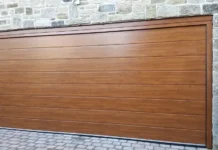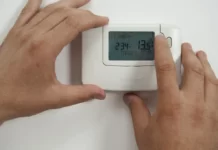Imagine that it’s the middle of the night, and your smoke alarm starts going off for no apparent reason. You jump out of bed because you think there might be a fire, but nothing is wrong. You are not alone if this has happened to you. Many people don’t understand why their smoke alarms go off for no reason. In today’s article, we’ll discuss why these alarms might go off and what you can do about them.
What is Smoke Alarm?
First, let’s understand what a smoke alarm is and how it works. A smoke alarm is a device that checks for smoke in the air, which could mean that there is a fire. It is an essential safety gadget often used in homes, businesses, and public buildings to notify people immediately if there is a fire risk. Smoke alarms look for smoke particles or, in some cases, high amounts of carbon monoxide gas.
When a smoke alarm senses smoke or a dangerous rise in carbon monoxide levels, it sounds a loud warning, usually in the form of a siren or a beeping sound. The goal of this alarm is to let people in the building know that there might be a fire or carbon monoxide leak so they can get out safely or do what they need to do to deal with the emergency.
Smoke alarms are essential safety tools because they give people time to leave a building before a fire spreads and becomes dangerous. It’s important to put smoke alarms in different parts of a building, like bedrooms, hallways, and common areas, so they can quickly find smoke and tell people immediately.
Most smoke alarms in homes run on batteries or are connected to the building’s electrical system and have a backup battery. Some more advanced models may also have alarms linked to each other. This means that if one alarm detects smoke, it will cause all connected alarms in the building to go off simultaneously, giving a more widespread warning throughout the building.
Regular upkeep, like testing the alarms, replacing the batteries, and keeping them clean of dust and other debris, is important to ensure that smoke alarms keep working well and can save lives.
Understanding Smoke Alarms
These gadgets can tell if there is smoke or much carbon monoxide in the air. When they think there might be a danger, they set off a loud warning to warn you and your family. This gives you and your family valuable time to get to safety.
7 Common Reasons Your Fire Alarm Goes Off Randomly
1. Smoke or Steam
Smoke or steam is among the most common things that sets off a false warning. Smoke alarms are very sensitive; even a small amount of smoke from cooking or steam from a hot shower can set them off. This is probably the case if your alarm is close to the kitchen or bathroom.
Here are some additional information on how smoke or steam can trigger false alarms in smoke detectors:
- Cooking-Related False Alarms: A lot of false warnings from smoke detectors can be caused by cooking. When you fry, grill, or even bake, the smoke and small particles that are made can easily reach the smoke alarm close. This is especially true if the alarm is set up in the kitchen or close to it.
- Steam from Showers: Smoke alarms can also be set off by steam from hot showers and baths, especially if the alarm is close to the bathroom. The alarm can go off because the steam particles can look like smoke.
- Toasting and Broiling: Small amounts of smoke or hot particles can be released into the air when you toast bread, broil food in the oven, or use a toaster oven. If you have a smoke alarm close, it might think this is a fire risk.
- Candles and Incense: When you burn candles or incense, smoke and small particles can be made, which could reach the smoke alarm. This could cause false alarms if the sensor is close by and sensitive.
To reduce the chances of false alarms caused by cooking or steam, consider the following tips:
• Proper Placement: Install smoke alarms far from the kitchen and bathroom to protect them from steam and smoke from cooking.
• Kitchen-Specific Alarms: Consider using smoke alarms that are made for the kitchen. They are less sensitive to typical cooking odors while still being able to detect a fire. Capabilities.
• Ventilation: Ensure your kitchen and bathroom have good air systems, like exhaust fans, to help eliminate smoke and steam.
2. Dust and Insects
Over time, dust and bugs can get inside your smoke alarm and block its sensors. When the sensors are blocked, the alarm may think there is a threat and go off, called a false warning. This won’t happen if you regularly clean and keep your smoke alarm.
When it comes to smoke alarms, dust and bugs can be trouble. Here’s more about how they can cause fake alarms and what you can do about it:
- Dust Buildup: Dust can build up inside the smoke alarm over time. When these particles build up on the sensors or other parts inside the device, they can make it harder for the device to identify smoke accurately. So, the alarm might think this dust is a possible threat, which could cause fake alarms.
- Insects: Insects can get inside a smoke alarm. This is especially true for small insects like ants or dust mites. These tiny creatures can get on the sensors or other sensitive parts and stop them from working as they should. Again, this can make the smoke alarm go off when there isn’t any smoke.
Follow these simple steps to stop fake alarms caused by dust and bugs:
- Clean It Regularly: Clean your smoke alarm as often. Most of the time, this means lightly vacuuming or dusting the outside and inside of the alarm. Make sure the power is turned off.
- Keep the Area Clean: Make sure the area around the smoke alarm is always clean. Dust and other things should not pile up too much near the warning.
- Seal Entry Points: Seal any place where bugs can get into the alarm. This could mean filling in holes or gaps with caulk or, if necessary, using bug screens.
- Replace alarms that are prone to bugs: If bugs are a big problem in your area or they keep coming back, you might want to use smoke alarms that are made to keep bugs out. These alarms may have extra safety features to keep bugs from messing with their sensors.
By staying vigilant about cleaning and maintenance, you can help ensure that your smoke alarm functions correctly and avoids false alarms caused by dust and insects.
3. Low Battery
A low battery is another common cause of fake alarms. When the batteries in a smoke alarm get low, they usually chirp to let you know it’s time to change them. If you don’t heed this warning, the battery could lose power and start going off randomly.
4. Aging Smoke Alarm
Like all other electronic gadgets, smoke alarms have a limited life span. Over time, their sensors can lose their accuracy, making it more likely that they will go off for no reason. If your smoke alarm is older than ten years, you should probably get a new one.
5. Electrical Interference
Sometimes, electrical interference from nearby tools or devices can cause your smoke detector to go off when it doesn’t need to. Make sure your smoke alarm isn’t in a place where electromagnetic radiation can affect it.
6. Extreme Temperatures
Temperatures that are too hot or too cold can make smoke alarms less sensitive. Don’t put them near heaters, air conditioners, or places sensitive to temperature changes. Choose the type of smoke detector that suits your local temperatures.
7. Faulty Wiring or Circuitry
In rare cases, a smoke alarm’s wiring or electronics can go wrong and cause it to go off for no reason. If you think this is the problem, it may need to be looked at and fixed by a professional.
How to Fix a Fire Alarm that Goes Off Randomly
Now that we’ve identified common reasons why did my fire alarm randomly go off in the middle of the night, let’s discuss what you can do to prevent or address the issue:
1. Regular Maintenance: Clean your smoke alarm periodically to remove dust and debris. It’s better to test it monthly as well to ensure it’s working correctly.
2. Battery Replacement: Keep in mind to replace the batteries in your smoke alarm as soon as you hear the low-battery warning chirp. This simple step can help prevent false alarms.
3. Proper Placement: During installments, ensure your smoke alarms are strategically located in your home. Avoid placing them near the kitchen or bathroom to reduce the risk of false alarms.
4. Upgrade When Needed: Periodic check on your smoke alarm gadgets; if your smoke alarm is old or unreliable, consider investing in a new one. Modern smoke alarms come with improved features and reliability.
5. Professional Inspection: A professional inspection will be your last resort if false alarms persist despite taking these precautions.
Conclusion
Even though it can be scary when your smoke alarm goes off in the middle of the night, you can handle the problem better if you know why these false alarms happen so often. By doing simple things like keeping the batteries fresh and ensuring the smoke alarm is in the right place, you can reduce the chance that it will go off for no reason. Remember that a smoke alarm’s main job is to keep you and your family safe, so keeping it in good shape is essential.












